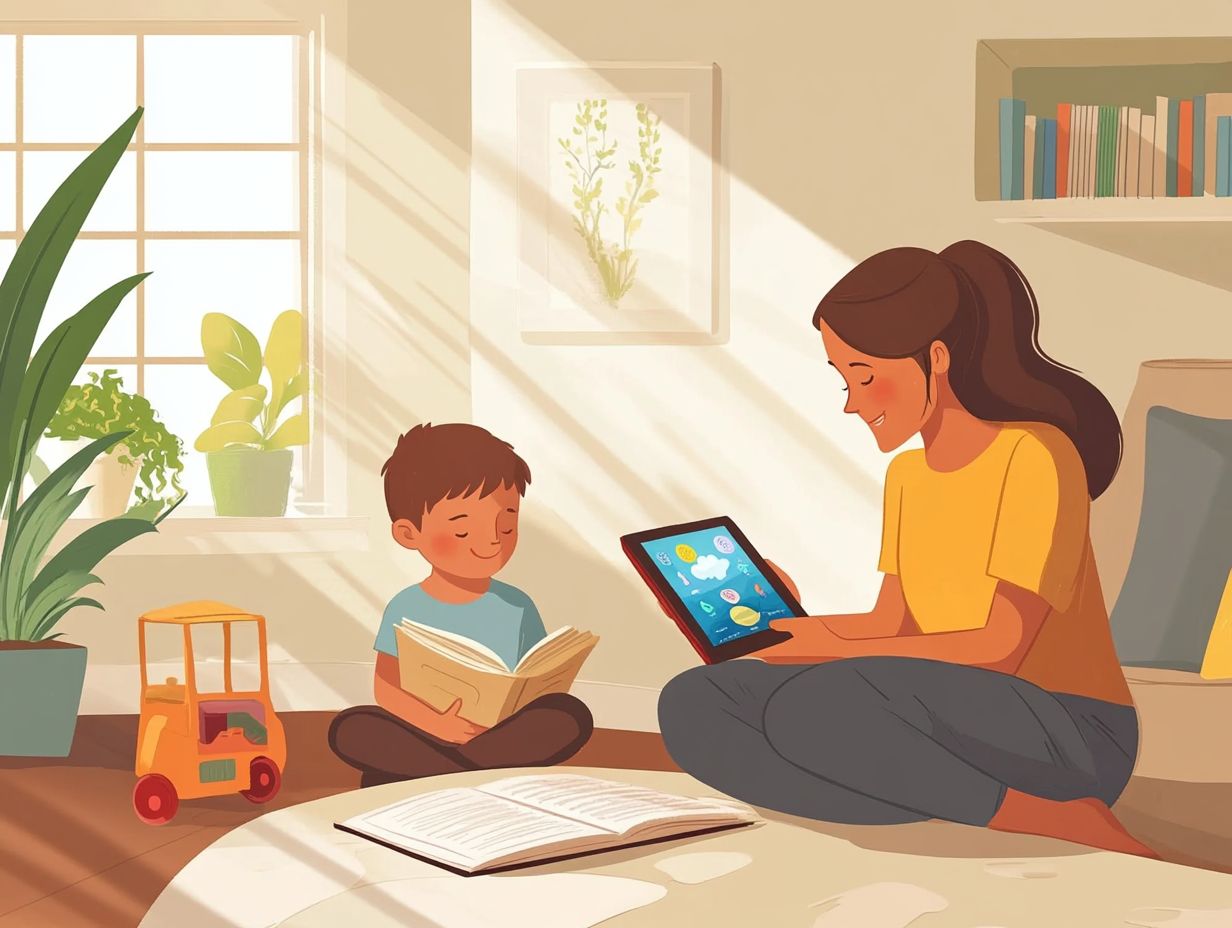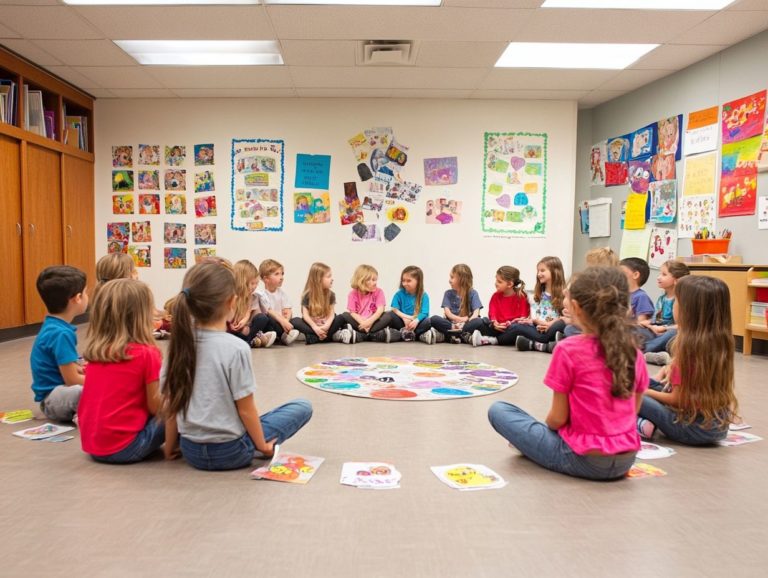What Resources are Available for Mindful Parents?
Parenting today can feel like a whirlwind! But guess what? Mindful parenting is here to help. This refreshing approach emphasizes presence, awareness, mindfulness, and intentionality in your journey of raising children.
This approach delves into the essence of mindful parenting, highlighting its significance and the myriad benefits it offers both you and your children. By enhancing parent-child relationships, reducing stress, and providing practical techniques to weave mindfulness into your daily routines, you can uncover the resources and strategies that have the potential to transform your parenting experience.
Contents
- Key Takeaways:
- What is Mindful Parenting?
- Why is Mindful Parenting Important?
- What are the Benefits of Mindful Parenting?
- 1. Improved Parent-Child Relationship
- 2. Reduced Stress and Anxiety Management
- 3. Better Emotional Regulation
- How Can Parents Practice Mindful Parenting?
- What Resources are Available for Mindful Parenting?
- How Can Parents Incorporate Mindful Parenting into Daily Life?
- 2. Practicing Gratitude and Mindful Moments
- 3. Being Present in Everyday Interactions with Children
- Frequently Asked Questions
- Mindful Parenting FAQs
Key Takeaways:

- Mindful parenting can improve parent-child relationships, reduce stress and anxiety, and improve emotional regulation.
- Resources like books, online courses, apps, and support groups are available to help parents practice mindful parenting.
- Parents can incorporate mindful parenting into daily life by setting intentional time, practicing gratitude, and being present in everyday interactions with their children.
- Mindful practices such as deep breathing exercises and guided meditations can aid in managing stress and improving emotional well-being for both parents and children.
What is Mindful Parenting?
Mindful parenting is an approach that weaves mindfulness into your parenting journey, highlighting the importance of emotional awareness, self-compassion, and a deliberate focus on the present moment as you navigate the complexities of raising children and addressing parenting challenges.
This practice helps you stay fully present and engaged, fostering emotional connections that support your child s developmental milestones. By creating a supportive home, you can inspire positive changes in your relationship with your child, promoting better social-emotional skills and mental health.
Influential figures like Mark Bertin, Elisha Goldstein, and Amy Saltzman champion strategies that enable you to manage stress and cultivate compassion for both yourself and your children, especially in a world where family stress can feel all-consuming.
Why is Mindful Parenting Important?
Recent parenting surveys indicate that adopting mindfulness and self-compassion can significantly alleviate parenting stress, leading to more harmonious family interactions and better emotional outcomes for children.
Mindful parenting is crucial in today s fast-paced world. It provides you with the essential tools to navigate parenting stress while cultivating a nurturing support system for your children. This practice not only enhances their social-emotional skills but also bolsters mental health an essential component for thriving families today!
As parenting challenges such as anxiety and emotional turmoil become increasingly common, embracing mindfulness enables you to establish a serene and accepting environment where both you and your children can flourish.
This intentional approach fosters emotional awareness and self-acceptance, ultimately promoting a healthier family dynamic.
What are the Benefits of Mindful Parenting?
The advantages of mindful parenting are extensive, significantly enhancing the bond between you and your child while also lowering stress and anxiety levels for both of you. Embracing mindful parenting techniques can lead to more structured routines and a calm environment in which your family can thrive.
These benefits not only promote personal growth but also foster a serene environment, which is vital for nurturing strong, supportive relationships within your family.
1. Improved Parent-Child Relationship
One of the significant advantages of mindful parenting is the improvement in your relationship with your child. Enhanced emotional connection and communication take center stage.
By practicing paying close attention and acceptance without judgment, you can cultivate an emotional space that fosters trust and understanding. This nurturing support not only deepens your bond but also promotes a learning process that benefits both you and your child.
By prioritizing open communication, you model how to navigate emotions effectively. This allows your child to express themselves freely.
This two-way dialogue encourages them to feel heard and valued, significantly enhancing their self-esteem. Utilizing techniques like reflective listening can deepen your understanding of your child’s thoughts and feelings, reinforcing that vital parent-child connection.
Healthy relationships thrive on acceptance, where you embrace your child’s unique feelings and experiences. This promotes resilience and empathy.
Ultimately, these mindful strategies create a harmonious environment that enables your child to develop emotional intelligence. This prepares them for healthier interactions beyond the family dynamic.
2. Reduced Stress and Anxiety Management
Mindful parenting can significantly reduce stress and anxiety for both you and your children. This creates a calm environment where emotional well-being can truly flourish.
By incorporating calming techniques like deep breathing exercises and self-compassion
This proactive approach lightens your individual stress and cultivates a supportive atmosphere that fosters healthy family dynamics. Mindfulness activities can be particularly beneficial in managing frustration and maintaining a balanced emotional state.
Practicing mindfulness encourages you to remain present during those challenging moments. This allows you to react thoughtfully rather than with impulsivity.
Techniques such as paying close attention and intentionally pausing before responding can aid in emotional regulation. This helps both you and your children to process feelings constructively.
Integrating gratitude practices into this framework nurtures a positive mindset. It enables your family to appreciate the small joys amidst daily chaos.
Ultimately, this leads to improved communication and emotional intelligence within the entire family. It significantly alleviates the stress and anxieties that often accompany the parenting journey.
3. Better Emotional Regulation

Better emotional regulation is a key benefit of mindful parenting. It allows you to manage your reactions and frustrations more effectively.
This crucial aspect of parenting creates a supportive environment where your children feel safe to express their emotions. Effective parenting techniques that focus on managing reactions and full attention can lead to positive changes in your family dynamics.
By practicing techniques like deep breathing, pausing before you respond, and acknowledging your own feelings, you demonstrate healthier coping mechanisms in the face of stress.
These mindful strategies help you avoid impulsive reactions and promote empathy and problem-solving skills in your children.
As you model these behaviors, your children learn to navigate their emotions. This enhances their social-emotional skills, essential for building positive relationships and coping with life’s challenges.
How Can Parents Practice Mindful Parenting?
You can elevate your parenting by embracing mindful techniques and activities that foster presence and awareness in your interactions with your children.
By integrating mindful breathing exercises, effective communication strategies, and self-care practices into your daily routine, you cultivate an environment that nurtures emotional well-being and supports child development.
This not only benefits you but also encourages your children to adopt mindfulness in their lives. These intentional practices enable your family to connect on a deeper level, fostering a more sustainable and enriching relationship.
1. Mindful Breathing Exercises and Guided Meditations
Mindful breathing exercises are essential practices in mindful parenting, acting as powerful tools for reducing stress and enhancing emotional awareness. By concentrating on your breath, you can cultivate a calm presence that improves your ability to connect with your children and respond thoughtfully to the many challenges of parenting. This practice fosters a sense of tranquility that benefits both you and your children.
These exercises can take various forms, such as deep belly breathing or the 4-7-8 technique, each designed to promote relaxation and clarity. When you engage in these techniques, you not only ground yourself but also model emotional regulation for your children, creating an environment of safety and understanding. Practicing these techniques can also address parenting struggles such as ADHD and autism, which require a calm and structured environment.
Incorporating mindful breathing into your daily routines can significantly diminish anxiety, paving the way for more intentional interactions. Just a few minutes each day can transform your family life, leading to remarkable improvements in family dynamics and achieving greater harmony and emotional resilience for everyone involved.
2. Mindful Communication Techniques
Mindful communication techniques can significantly enhance your interactions with your children, fostering deeper emotional connections through practices like active listening and acceptance. By prioritizing open dialogue and creating a safe emotional space for your children to express their feelings, you can build the trust and understanding that are essential for a nurturing parent-child relationship.
This approach not only enriches communication but also cultivates healthier patterns within your family. Incorporating parenting tips and insights from experts can further enhance your ability to foster a supportive and understanding environment.
When you actively engage in these techniques, you ll likely notice that your children feel more valued and heard, which leads to greater emotional security. Simple practices, like reflecting their feelings back to them and validating their emotions, help transform potentially conflictual moments into opportunities for bonding and growth.
Embracing a non-judgmental and empathetic stance encourages your children to share their thoughts freely, ultimately nurturing an environment rich in acceptance and emotional depth. By accepting feelings and providing nurturing support, you’ll witness a profound shift in your family dynamics, creating a stronger foundation of love and mutual respect.
3. Mindful Self-Care Practices
Incorporating mindful self-care practices is essential for you as a parent, especially when it comes to maintaining your emotional health and managing parenting stress effectively. By prioritizing self-compassion and engaging in activities that foster relaxation and rejuvenation, you can recharge and tackle parenting challenges with renewed energy and focus.
This self-care commitment not only revitalizes you but creates a happier, healthier family environment! When you carve out time for yourself be it through yoga, meditation, or simply savoring a quiet cup of tea you enhance your ability to respond thoughtfully rather than react impulsively to stressful situations. Utilizing calming techniques like deep breathing exercises can also help manage reactions effectively.
For instance, dedicating time to exercise can uplift your mood and bolster your resilience, while regular social interactions with supportive friends can provide much-needed emotional nourishment. These practices alleviate stress and cultivate a nurturing environment at home, reinforcing the vital connection between self-care, emotional awareness, and effective parenting.
As you become more attuned to your own needs, you ll find yourself better equipped to empathize with your children, fostering a harmonious family dynamic.
What Resources are Available for Mindful Parenting?
A wealth of resources awaits you as you embark on the journey of mindful parenting! From insightful books and engaging online courses to specialized apps and supportive community groups, these tools help you learn effective parenting strategies.
These invaluable resources, including those provided by esteemed organizations like ZERO TO THREE, equip you with the knowledge to gracefully navigate the challenges of parenting through the lens of mindfulness.
By embracing these resources, you can foster a more compassionate and understanding environment for your family.
1. Books on Mindful Parenting

You ll find a wealth of insightful books on mindful parenting that offer guidance and strategies for nurturing self-compassion and emotional awareness in both you and your children. These carefully selected readings provide practical techniques to help you navigate the complexities of parenting.
Many of these titles emphasize the importance of emotional regulation, which is the ability to manage your emotional responses to situations, and stress management.
For instance, *The Whole-Brain Child* by Daniel J. Siegel and Tina Payne Bryson integrates child development and brain science. This book explores how integrating brain science into your parenting practices can deepen your understanding of your child s emotional responses.
Another captivating read, *Mindful Parenting* by Jon and Myla Kabat-Zinn, introduces essential practices for being present and responsive to your children s needs, helping you stay anchored in the moment.
For instance, *Simplicity Parenting* by Kim John Payne offers valuable insights on how to simplify your children’s environments and schedules, effectively reducing stress for both kids and adults.
By incorporating these resources into your parenting journey, you can cultivate a more mindful approach, fostering stronger connections and emotional resilience within your family.
2. Online Courses and Workshops
Online courses and workshops dedicated to mindful parenting offer you invaluable education and training on a variety of mindfulness techniques and practices tailored to different developmental milestones.
These resources provide flexible learning opportunities that seamlessly fit into your busy schedule. They equip you with essential tools to manage stress and enhance your relationships with your children, encouraging ongoing personal and familial growth!
For instance, many of these programs include interactive modules focused on emotional regulation and active listening. This enables you to respond thoughtfully rather than react impulsively and to accept your child’s feelings.
Workshops often feature discussions led by experts and peer support groups, fostering a sense of community among participants.
You’ll find resources like guided meditations and journaling exercises commonly integrated, helping you cultivate a deeper awareness of your thoughts and feelings, as well as those of your children. These practices are great for managing anxiety and can make a real difference!
By making these educational opportunities accessible, you not only learn how to create a calmer home environment but also become a role model for your children in practicing mindfulness and empathy.
3. Mindful Parenting Apps
Mindful parenting apps are becoming essential tools for integrating mindfulness into your daily routine. They offer guided meditations and practical exercises designed to enhance your parenting journey.
These applications don t just provide invaluable resources; they also feature customized programs tailored to various stages of parenting. This helps you create a nurturing environment and manage toddler behavior effectively.
For example, some apps include interactive elements like community support forums, where you can share experiences and strategies with other parents, fostering a true sense of belonging.
By embracing mindfulness techniques, you can learn to manage your reactions more effectively, which enhances your emotional regulation and overall well-being, promoting compassion for self.
With thoughtful reminders for self-care and daily affirmations, these mindful parenting tools help you stay focused on cultivating a mindful approach that benefits not just you but also your children.
Support Groups and Communities
Support groups and communities focused on mindful parenting provide you with a valuable platform to share your experiences, insights, and challenges. These forums can also offer support for specific issues like ADHD and autism.
Engaging with others in a supportive environment fosters emotional connections. It encourages the exchange of mindful parenting techniques that can help you manage stress and improve overall family dynamics.
This sense of community can be pivotal as you navigate the complexities of parenting together.
These networks not only offer a safe space for you to share your personal stories but also enable you to explore diverse perspectives on parenting, enhancing your awareness of different parenting insights.
By discussing various approaches and methods, you can become more adaptable and attuned to your children’s needs while refining your own practices.
These gatherings often lead to the formation of lasting friendships. These friendships can serve as vital resources during challenging times.
Ultimately, the connections you forge within these groups cultivate a sense of belonging, reminding you that you aren t alone in your journey. They equip you with the tools to be more mindful and effective in your parenting role.
How Can Parents Incorporate Mindful Parenting into Daily Life?
Incorporating mindful parenting into your daily life requires intentional moments and practices that nurture gratitude, presence, and emotional awareness within your family routines. This approach fosters skills to understand and manage emotions and promotes a calm environment.
By dedicating specific times for mindfulness, you reinforce your commitment to being fully present with your children. This deepens emotional connections and helps you manage frustration and parenting stress more effectively.
This integration creates a culture of mindfulness that enriches the well-being of your entire family.
1. Setting Intentional Time for Mindful Parenting
Setting aside intentional time for mindful parenting is essential for fostering emotional awareness and enhancing connections within your family routines. This practice can also help establish structured routines, benefiting both you and your children.
By deliberately scheduling moments of mindfulness, whether during family meals or through dedicated mindfulness activities, you can create an atmosphere that encourages emotional growth and deepening connections. This practice emphasizes the significance of presence and mindfulness in your everyday interactions.
Incorporating strategies like family game nights or tech-free evenings opens the door to engaging dialogues and bonding opportunities. This promotes positive changes in your family dynamics.
You might also consider setting aside specific times each week for one-on-one check-ins with each child; this helps cultivate deeper relationships and understanding.
Simple activities, such as guided meditations or nature walks, not only promote a sense of calm but also provide a safe space for family members to express their thoughts and feelings. This enhances emotional connection and understanding within the family.
By making a conscious effort to integrate these practices, you can create an enriched environment where emotional intelligence flourishes. This ultimately enhances your family dynamics.
2. Practicing Gratitude and Mindful Moments

Practicing gratitude and adding mindful moments into your daily life can profoundly enhance emotional connections and family routines. This practice helps manage family stress and anxiety.
By reflecting on what you re grateful for and sharing these experiences with your children, you cultivate an appreciation for the present moment. This also nurtures a deeper understanding of emotional awareness.
Celebrate every little joy together! These moments will strengthen the bonds you share.
For example, setting aside a few moments during dinner each evening to discuss what each family member is thankful for not only fosters open communication but also encourages everyone to reflect on the positive aspects of their day. This practice promotes a compassionate response and helps build a supportive family environment.
Incorporating mindfulness activities, such as taking nature walks where you and your family can observe your surroundings with intention, promotes a sense of peace and togetherness. These walks can be a part of your structured routines to manage family stress and anxiety.
These practices help you develop empathy, self-compassion, and emotional resilience, enriching your relationships and enhancing your family’s overall well-being. Incorporating acceptance without judgment and self-acceptance can make a positive change in your parenting techniques.
3. Being Present in Everyday Interactions with Children
Being present in your everyday interactions with children is essential to mindful parenting, elevating emotional awareness and strengthening family connections. This practice also helps parents manage reactions and nurture support for their child’s emotional state.
By focusing entirely on your children during conversations, playtime, or daily routines, you can enhance the quality of these interactions and model mindfulness for them. This consistent practice fosters a deeper emotional bond and understanding within your family, helping manage parenting stress and frustration.
The importance of being attentive cannot be overstated, as it lays the groundwork for open communication, trust, and emotional security. You can cultivate mindfulness by setting aside distractions during family time turn off electronic devices and engage in eye contact to reinforce your presence. Encouraging shared activities, such as cooking or crafts, creates opportunities for meaningful discussions that nurture your child’s emotional development and social-emotional skills.
Taking a moment to pause and breathe together during stressful situations can also help establish a calm environment, further enhancing family dynamics and the overall well-being of both you and your children. Deep breathing exercises and other calming techniques can be vital tools in managing reactions and emotional states.
For more insights into mindful parenting, you can explore works by experts like Dr. Shefali Tsabary, Mark Bertin, Elisha Goldstein, and Amy Saltzman.
Frequently Asked Questions
What Resources are Available for Mindful Parents?
There are plenty of resources available for mindful parents. Some of them include:
- Books: There are many books available on mindful parenting, including “The Conscious Parent” by Dr. Shefali Tsabary and “Mindful Parenting” by Kristen Race.
- Online courses: There are various online courses that offer guidance and support for mindful parenting, such as the Mindful Parenting Online Course by the Mindful Parenting Institute.
- Apps: There are also apps available that provide tools and techniques for mindful parenting, such as “MentalUP” and “Calm.”
How can Mindful Parenting Benefit Me and My Child?
Practicing mindful parenting can benefit both you and your child in various ways, such as:
- Reduced stress and anxiety: Mindful parenting can help you to stay present and calm in challenging situations, reducing your stress levels.
- Improved communication: By being more aware and mindful, you can improve your communication with your child and deepen your relationship.
- Better emotional regulation: Mindful parenting can help you and your child learn to regulate emotions in a healthy way.
Mindful Parenting FAQs
Are there any Support Groups for Mindful Parents?
There are support groups available for mindful parents. These groups provide a space for parents to connect and share experiences while learning from one another. You can search for local support groups in your area or join online communities and forums.
Do I Have to Practice Mindful Parenting all the Time?
No, you do not have to practice mindful parenting all the time. It’s essential to find a balance and not put pressure on yourself to be mindful every moment. Start with small steps and gradually incorporate it into your daily routine.
Are there any Mindful Parenting Workshops or Retreats?
There are workshops and retreats available that focus on mindful parenting. These workshops and retreats are fantastic opportunities to learn, practice, and connect with other mindful parents.
You can search for local workshops or retreats or look for virtual options.
Can I Incorporate Mindfulness into my Child’s Routine?
Absolutely! There are many ways to incorporate mindfulness into your child’s routine. Some ideas include:
- Guided meditations or breathing exercises before bed or in the morning.
- Mindful activities such as coloring, yoga, or mindful walks.
- Encouraging your child to practice gratitude and reflection.
Start practicing mindfulness with your children today and enjoy the benefits it brings to your family life!






